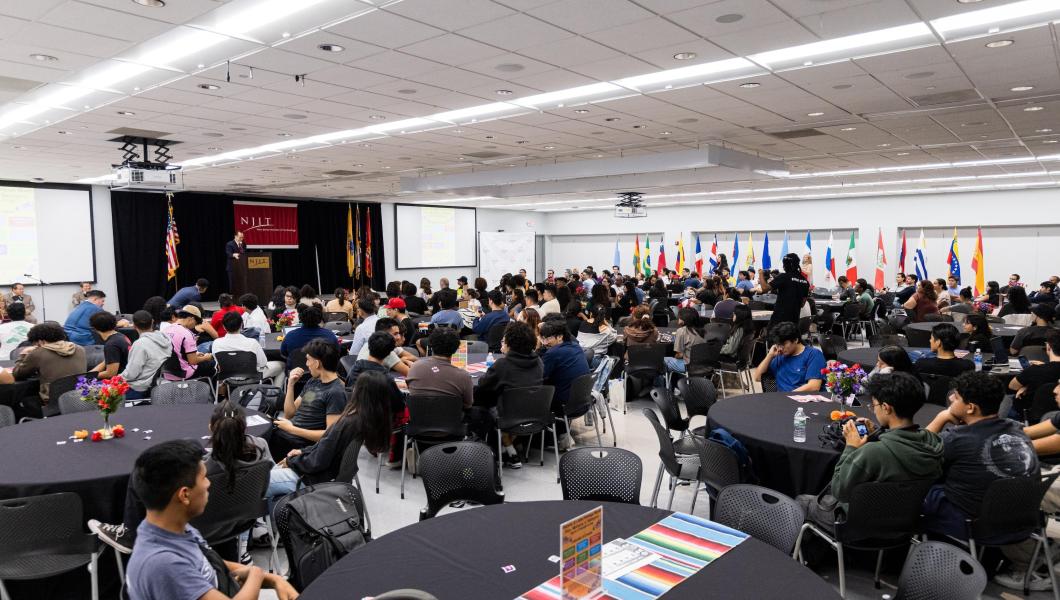NJIT Undergrad Wins Association for Women in Mathematics' National Essay Contest

As most students were buried in final exams last December, Iniobong Ofonime took an extra assignment outside her usual work as an engineering student — rather than applying mathematics to solve problems, she decided to profile an inspirational mathematician.
Her efforts have added up to a first-place finish among undergraduates in the Association for Women in Mathematics' (AWM) national essay competition, announced fittingly on International Women's Day.
The annual contest draws hundreds of student submissions from across the U.S. and abroad, spotlighting the contributions of women and individuals from underrepresented gender identities in the mathematical sciences.
“I didn't expect to win anything,” Ofonime ’27, a mechanical engineering major and Albert Dorman Honors College scholar. “My initial motivation was simply to try something new. I thought, 'Why not? … At least I'll learn something and make new connections.’ It was so rewarding seeing everything come together the way it did.”
The connections began through NJIT mathematics professors Peter Ward and Michelle Cirillo, who introduced Ofonime to the contest and her future subject: Mahya Ghandehari, an associate professor at the University of Delaware currently studying harmonic analysis and network theory (how mathematical patterns in small networks can reveal behaviors of larger ones).
However, it was Ghandehari’s perseverance in her academic journey from Iran to North America that left an impression on Ofonime during their Zoom call, who herself came to NJIT from Nigeria.
“She was in her last semester as an undergrad studying civil engineering when she realized her heart wasn't in it,” Ofonime explained. “She decided to change course and pursue a master's in mathematics, scoring seventh highest in Iran's national examination, before leaving Iran and eventually pursuing Ph.D. studies in a completely different branch of mathematics in Canada. At each stage, she was overcoming an obstacle.”
For Ofonime, Ghandehari's story of adapting to new environments and challenges resonated. “Moving to an entirely different country was definitely a huge challenge in my first year,” Ofonime recalled. “The culture was different, and I had to push myself out of my shell.
“What I took away from this experience is that you don't have to follow a certain path … progress isn't linear. You can get to where you need to be in different ways.”
Ofonime’s path has already led to several notable early successes of her own.
She was one of three 2024 Akash and Shai Kuruvilla Memorial scholars and was one of just 50 students worldwide selected for the New Face of Tech Scholarship winners from the 1000 Dreams Fund last year.
At NJIT, Ofonime is assisting in research at the Functional Materials & Biomedical Devices Laboratory under engineering professor Lin Dong and Ph.D. student Sun Hwa Kwon, exploring piezoelectricity with potential applications in advanced sensor technology. Her work is helping develop innovative heart rate monitoring techniques using mechanical stress and electrical generation.
“I want to understand how to use my knowledge to help society and contribute meaningfully,” she said of her career plans, which involve working in industry before potentially pursuing specialized graduate studies. “My goal is to figure out what field interests me most and specialize in the area of engineering I'm most passionate about.”
Ofonime also keeps involved on campus — a key she says to her success transitioning to life abroad at NJIT — as an event coordinator for the American Society of Mechanical Engineers and as a member of the NJIT's Baja SAE’s Chassis sub-team.
For now, Ofonime’s latest essay contest victory will soon reach a wider audience.
Her essay, titled “The Power of Perseverance: Mahya Ghandehari's Story of Courage and Tenacity,” is slated to appear on the AWM website and be featured in the organization's newsletter later this spring.
“I want people to know that when you put in hard work and are determined, you can achieve almost anything,” she said. “Dr. Ghandehari could have given up after her civil engineering degree. Instead, she took a leap of faith and worked hard to pursue her true passion.”

